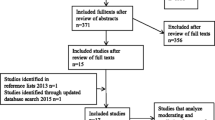Abstract
Purpose
Delivering palliative/supportive cancer care (PSCC) early in the course of cancer care can enhance patients’ and caregivers’ quality of life, reduce anxiety and depression, and prolong patients’ lives. However, their support needs are analyzed insufficiently from viewpoints other than their own. The goal of this study was to explore the perspectives of healthcare professionals on desirable standards of support for tumor patients and caregivers across the cancer treatment trajectory. It further aimed at identifying starting points for PSCC to address these needs.
Methods
Nine healthcare professionals of varying disciplines in a large German university hospital each participated in one of two focus groups. The qualitative data was analyzed following the grounded theory methodology.
Results
The healthcare professionals described it as desirable standards that tumor patients and caregivers receive support coping with tasks, accepting the situation, generating strength, feeling trust, and gaining clarity, thus increasing their sense of control. These support needs were seen as important throughout the whole cancer treatment trajectory of tumor patients and their caregivers.
Conclusions
Team meetings, supervision, tailored education, and structural improvements may aid healthcare professionals to develop and implement ways to further support patients and caregivers. Also, patients’ and caregivers’ support needs should be screened regularly, e.g., when treatment phases change. This would complement healthcare professionals’ subjective theories of relevant needs during a specific treatment phase.


Similar content being viewed by others
References
LeBlanc TW, El-Jawahri A (2015) When and why should patients with hematologic malignancies see a palliative care specialist? Hematology Am Soc Hematol Educ Program 2015:471–478. doi:10.1182/asheducation-2015.1.471
Leitlinienprogramm Onkologie (Deutsche Krebsgesellschaft; Deutsche Krebshilfe; AWMF) (2015) S3-Leitlinie Palliativmedizin für Patienten mit einer nicht heilbaren Krebserkrankung. Langversion 1(1):1–268
Hui D, Bruera E (2016) Integrating palliative care into the trajectory of cancer care. Nat Rev Clin Oncol 13:159–171. doi:10.1038/nrclinonc.2015.201
Ramchandran K, Tribett E, Dietrich B, Von Roenn J (2015) Integrating palliative care into oncology: a way forward. Cancer Control 22:386–395
Temel JS, Greer JA, Muzikansky A et al (2010) Early palliative care for patients with metastatic non-small-cell lung cancer. N Engl J Med 363:733–742. doi:10.1056/NEJMoa1000678
Bakitas M, Lyons KD, Hegel MT et al (2009) Effects of a palliative care intervention on clinical outcomes in patients with advanced cancer: the project ENABLE II randomized controlled trial. JAMA 302:741–749. doi:10.1001/jama.2009.1198
Zimmermann C, Swami N, Krzyzanowska M et al (2014) Early palliative care for patients with advanced cancer: a cluster-randomised controlled trial. Lancet 383:1721–1730. doi:10.1016/S0140-6736(13)62416-2
Smith TJ, Temin S, Alesi ER et al (2012) American Society of Clinical Oncology provisional clinical opinion: the integration of palliative care into standard oncology care. J Clin Oncol 30:880–887. doi:10.1200/JCO.2011.38.5161
Adams M (1991) Information and education across the phases of cancer care. Semin Oncol Nurs 7:105–111. doi:10.1016/0749-2081(91)90088-7
Given BA, Given CW, Sherwood PR (2012) Family and caregiver needs over the course of the cancer trajectory. J Support Oncol 10:57–64. doi:10.1016/j.suponc.2011.10.003
Peppercorn JM, Smith TJ, Helft PR et al (2011) American society of clinical oncology statement: toward individualized care for patients with advanced cancer. J Clin Oncol 29:755–760. doi:10.1200/JCO.2010.33.1744
Smith A, Hyde YM, Stanford D (2015) Supportive care needs of cancer patients: a literature review. Palliat Support Care 13:1013–1017. doi:10.1017/S1478951514000959
Carter N, Miller PA, Murphy BR et al (2014) Healthcare providers’ perspectives of the supportive care needs of men with advanced prostate cancer. Oncol Nurs Forum 41:421–430. doi:10.1188/14.ONF.421-430
Aldaz BE, Treharne GJ, Knight RG et al (2016) Oncology healthcare professionals’ perspectives on the psychosocial support needs of cancer patients during oncology treatment. J Health Psychol:1–13. doi:10.1177/1359105315626999
Bauman JR, Temel JS (2014) The integration of early palliative care with oncology care: the time has come for a new tradition. JNCCN J Natl Compr Cancer Netw 12:1763–1771
Helfferich C (2011) Die Qualität qualitativer Daten. VS Verlag für Sozialwissenschaften, Wiesbaden, doi. doi:10.1007/978-3-531-92076-4
Schulz M (2012) Quick and easy!? Fokusgruppen in der angewandten Sozialwissenschaft. In: Schulz M, Mack B, Renn O (eds) Fokusgruppen der empirischen Sozialwiss. VS Verlag für Sozialwissenschaften, Wiesbaden, pp 9–22
Strauss A, Corbin J (1996) Grounded theory: Grundlagen qualitativer Sozialforschung. Weinheim, Beltz/PsychologieVerlagsUnion
Mey G, Mruck K (2010) Grounded-theory-Methodologie. In: Handb. Qual. Forsch. Der Psychol. VS Verlag für Sozialwissenschaften, Wiesbaden, pp 614–626
Charmaz K (2014) Constructing grounded theory, 2nd edn. Sage publications, Los Angeles
Corbin J, Strauss A (2014) Basics of qualitative research: techniques and procedures for developing grounded theory, 4th edn. Sage publications, Los Angeles
Stern PN (1980) Grounded theory methodology: its uses and processes. Image (IN) 12:20–23. doi:10.1111/j.1547-5069.1980.tb01455.x
Emanuel LL, Alpert HR, Emanuel EE (2001) Concise screening questions for clinical assessments of terminal care: the needs near the end-of-life care screening tool. J Palliat Med 4:465–474
Costanza R, Fisher B, Ali S et al (2007) Quality of life: an approach integrating opportunities, human needs, and subjective well-being. Ecol Econ 61:267–276. doi:10.1016/j.ecolecon.2006.02.023
Henoch I, Danielson E (2009) Existential concerns among patients with cancer and interventions to meet them: an integrative literature review. Psychooncology 18:225–236. doi:10.1002/pon.1424
Author information
Authors and Affiliations
Corresponding author
Ethics declarations
All procedures performed in the study involving human participants were in accordance with the ethical standards of the institutional research committee and with the 1964 Helsinki Declaration and its later amendments or comparable ethical standards. The study was part of a research project approved by the ethical review committee of the large German university hospital where the study was conducted.
Additional information
This study was presented as a poster at the 11th Congress of the “Deutsche Gesellschaft für Palliativmedizin”
Rights and permissions
About this article
Cite this article
Rohrmoser, A., Preisler, M., Bär, K. et al. Early integration of palliative/supportive cancer care—healthcare professionals’ perspectives on the support needs of cancer patients and their caregivers across the cancer treatment trajectory. Support Care Cancer 25, 1621–1627 (2017). https://doi.org/10.1007/s00520-017-3587-x
Received:
Accepted:
Published:
Issue Date:
DOI: https://doi.org/10.1007/s00520-017-3587-x




